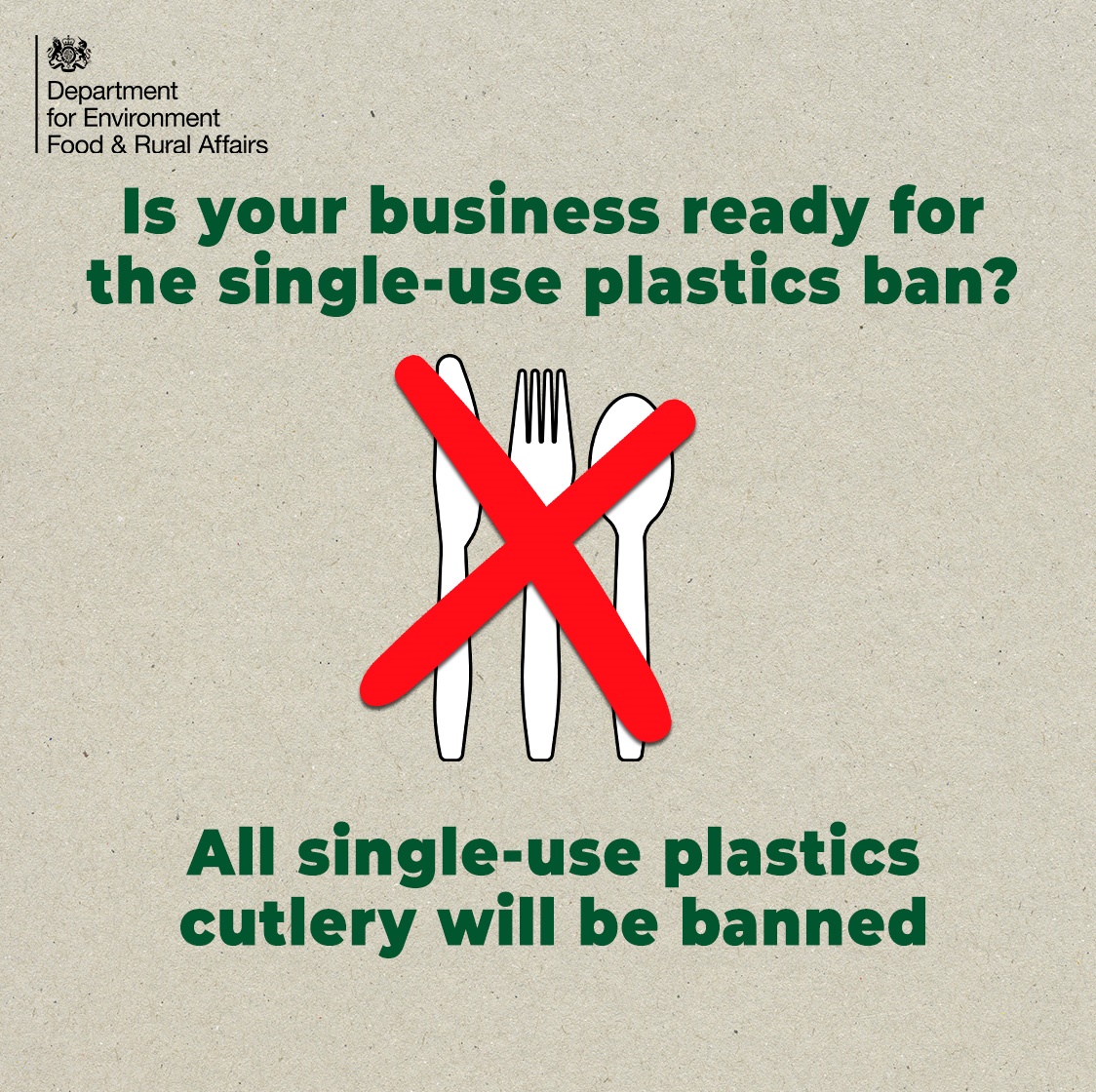Are you ready for the new ban and restrictions on some single-use plastic items?
Please read the following information provided to us by the Department for Environment, Food and Rural Affairs, we urge all members to take advantage of the downloadable posters and documents in the lower half of the article:
This ban applies to England only
From 1 October 2023 there will be additional bans and restrictions on single-use plastic items.
Further guidance for businesses on the new regulations can be found on GOV.UK. You can also download the poster to find out more.
We want to ensure industry stakeholders – retailers, suppliers and manufacturers – are aware of the changes coming into effect, when they will be required to make them and why the ban is coming into force.
The upcoming ban includes polystyrene cups and food containers, single-use plastic cutlery and single-use balloon sticks. There will also be a restriction to the supply of single-use plastic trays and bowls to members of the public, although businesses can continue to supply these items if they are used as packaging in shelf-ready pre-packaged food items.

How to prepare for the single-use plastics ban:
The government response to the consultation on these bans, published in January, set out that these restrictions would be introduced from October 2023 instead of April 2023, giving businesses more time to prepare.
Businesses will need to use up existing stock and find alternative substitutes or reuse solutions by 1 October 2023.
This ban compliments the existing restrictions on other single-use plastic items including plastic straws, cotton buds and drink stirrers and our carrier bag charge.
Why we are banning single-use plastics
The government is committed to tackling plastic pollution and littering and to reduce avoidable waste. Single-use plastics have damaging environmental impacts as they are commonly littered and are difficult to recycle. These impacts need to be managed so that we can protect our environment.
Damaging environmental impacts: Plastic pollution takes hundreds of years to break down and inflicts serious damage to the environment. It is also a source of greenhouse gas emissions, from the production and manufacture of the plastic itself to the way it is disposed of.
Unnecessary littering: England uses around 2.7 billion items of single-use cutlery — most of which are plastic — and 721 million single-use plates per year, but only 10% are recycled.
Enforcement
We know that people and businesses want to do the right thing for the environment and support our ban on single-use plastics. However, if the rules are not complied with, a range of enforcement options have been provided, including both civil and criminal sanctions. The bans will be enforced by Trading Standards
Further information
- Access single-use plastics ban Q&As
- Download thesingle-use plastics ban poster to see what items are included and what items are exempt
- View the single-use plastics ban toolkit for useful communication products
- Guidance: New restrictions on polystyrene cups and food containers, single-use plastic cutlery, balloon sticks, trays, bowls and plates
- Guidance: Existing single-use plastic item restrictions
- Guidance: Carrier bag charge
Further questions
- If you have any questions about what the new rules mean for your business, please contact plastics.consultation@defra.gov.uk.
- You can also visit the Defra stand at the Restaurants and Takeaway packaging EXPO on October 10/11, where you can speak directly with the Department’s SUP experts.
Sign up to the UK Plastics Pact
Members of the UK Plastics Pact have achieved an 84% reduction in unnecessary single-use plastics since 2018 by successfully driving the reuse of problematic plastic items. To find out more and to be part of this success please sign up here.
Thank you to businesses and trade associations who have already offered to share information to help businesses comply with the ban by generating further public awareness and understanding of the need to minimise single-use plastic waste.
We would be grateful if you would please forward this article to impacted businesses.
Test
Resources
All Resources-
Retra Alert: SUMMER 2025 Digital Magazine
Your exclusive member magazine, Retra Alert, is here! Explore it today - now 100% digital and accessible across all your devices.
-
Take part in the Net Zero Business Census
The Net Zero Business Census 2025 is a national initiative aimed at gathering essential data on UK businesses' progress towards net zero.
-
High Street Matters: Beyond Cars
Are low traffic neighbourhoods killing local businesses, or breathing new life into our high streets? This episode of High Street Matters explores how reducing vehicle traffic is transforming shopping districts across Britain.
-
Retra Alert: SPRING 2025 Digital Magazine
Your exclusive member magazine, Retra Alert, is here! Explore it today - now 100% digital and accessible across all your devices.